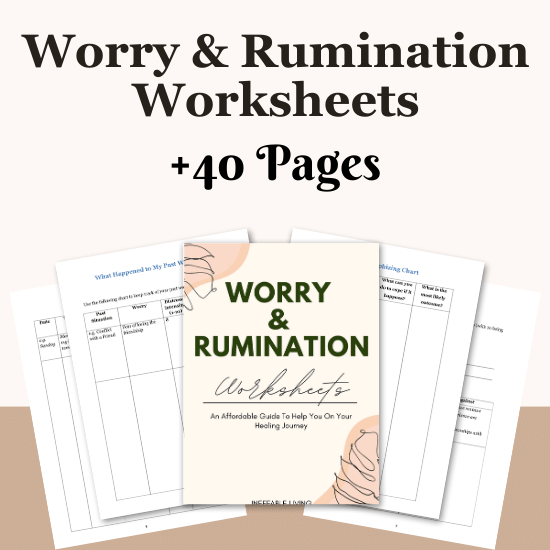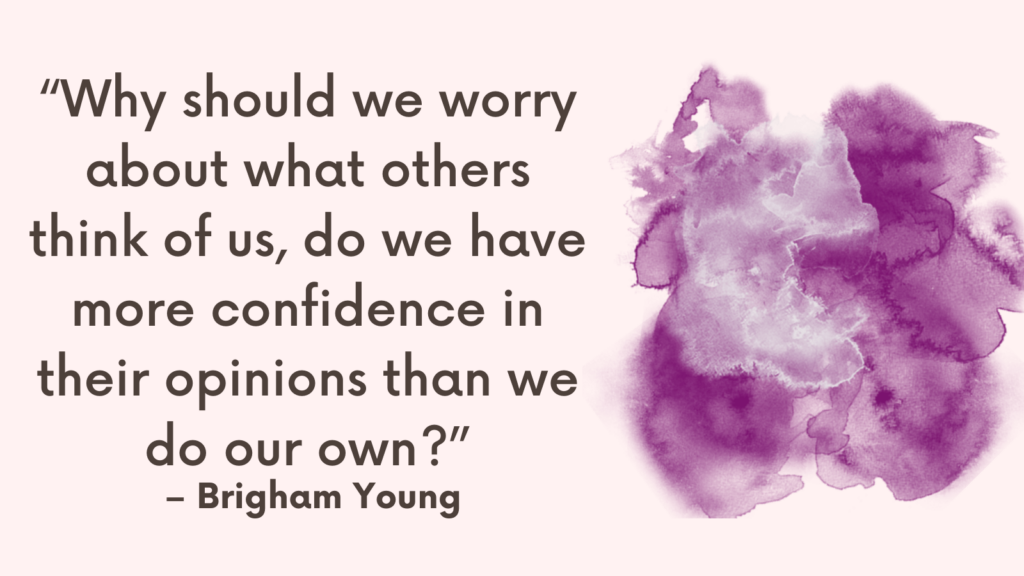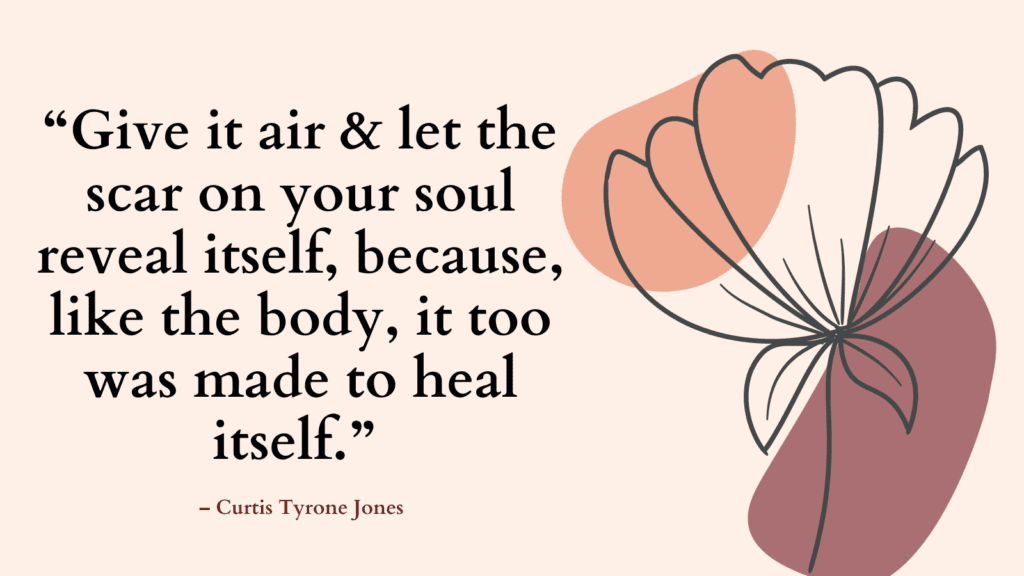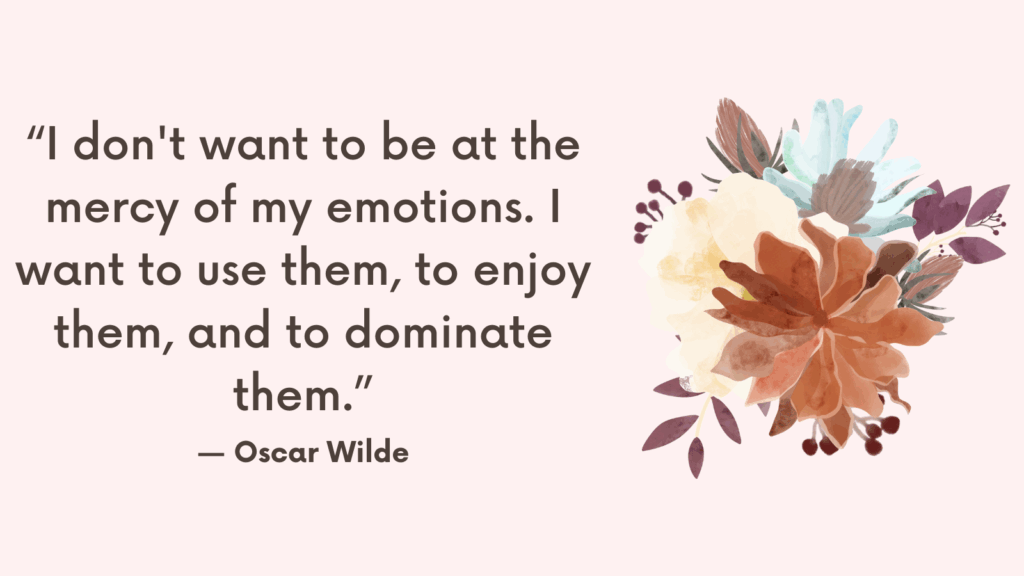In this post, you’re going to learn how to stop post-event rumination.
After social events or conversations, do you find yourself caught in a loop of self-criticism and doubt, replaying moments and imagining alternative scenarios where you said the perfect thing?
This common pattern, known as post-event rumination, can exacerbate social anxiety and prevent you from enjoying interactions with others.
Understanding Rumination
Rumination involves continuously thinking about the same thoughts, which are often sad or dark.
When these thoughts are about social interactions, they can lead to chronic stress and anxiety, impacting your ability to connect with others effectively.
Recognizing that you’re caught in this loop is the first step towards making a change.
Related: Negative Core Beliefs List (& 8 Tips On How To Challenge Them)
How To Stop Post-Event Rumination?
1. Challenge Your Perceptions
Your evaluation of social interactions is likely skewed by your own harsh self-judgment.
You might think that your comments came off far worse than they actually did, a tendency known as “catastrophizing.”
Start by acknowledging that your self-evaluation might be distorted.
If you find yourself thinking, “I was so awkward,” try to reframe these thoughts as, “I felt anxious.”
Separating your emotions from your identity helps reduce the impact of negative self-judgment.
2. Redirect Your Focus
A significant distortion in social anxiety is the belief that everyone is noticing and judging your every action, known as spotlight effect.
It’s essential to realize that people are generally more concerned with their own behaviors and thoughts than with yours.
Practice shifting your focus outward during social interactions: listen more intently, ask questions, and engage genuinely with others.
This can help reduce the time spent over-analyzing your own actions.
Related: How to Stop “What If” Anxiety Thinking?
3. Normalize Imperfection
Accepting that making social blunders is part of being human can significantly reduce the pressure you feel during interactions.
Everyone makes mistakes, says awkward things, or feels out of place at times—these experiences do not define your worth or social capabilities.
Embracing vulnerability and allowing yourself to make mistakes can lead to more authentic relationships and reduce the fear of judgment.
4. Cognitive Restructuring
Cognitive restructuring involves changing the patterns of thought that lead to anxiety.
When you catch yourself ruminating, actively challenge these thoughts:
– Is there evidence that others perceived me as negatively as I perceive myself?
– What would I say to a friend who had this same thought?
– Could there be a different interpretation of the interaction?
By questioning your automatic thoughts, you can begin to break the cycle of rumination and reduce the likelihood of these thoughts escalating into anxiety.
Related: How To Do Thought Work In 3 Simple Steps

FAQs
What are common thoughts during post-event rumination?
People often think:
- “Why did I say that?”
- “They probably think I’m weird or annoying.”
- “I should have kept quiet.”
- “I ruined everything.”
These thoughts are usually exaggerated, one-sided, and driven by fear rather than fact.
Related: Future Tripping: Top 9 Ways to Avoid Future-Tripping
How does post-event rumination affect my mental health?
It keeps you stuck in self-doubt and fuels ongoing anxiety. It can lead to social withdrawal, lower confidence, and feelings of shame. Over time, it reinforces negative self-beliefs and makes it harder to enjoy or participate in social interactions.
Is it possible to remember an event more negatively than it actually was?
Yes. Anxiety often distorts your memory. You may focus only on what felt awkward or embarrassing and completely overlook what went well. Other people typically don’t remember your missteps the way you do — if they noticed them at all.
What’s the difference between rumination and reflection?
Reflection helps you learn and grow; rumination keeps you stuck. Reflection is objective and solution-focused. Rumination is repetitive, self-critical, and emotionally draining. If your thinking leads to insight and peace, it’s reflection. If it leads to shame and regret, it’s rumination.
Will distracting myself help?
Yes, healthy distraction can break the loop — especially when you engage in something mentally or physically absorbing like exercise, reading, or a creative task. It’s not avoidance if it helps you stop spiraling and reconnect with the present moment.
Related: Why Do Intrusive Thoughts Feel So Real? Top 4 Reasons
Why does rumination feel so hard to stop?
Rumination creates a false sense of control. Your brain believes that by replaying the event, you can prevent future embarrassment or figure out what went wrong. But this thinking loop doesn’t bring clarity — it only deepens your distress. The more you ruminate, the more your brain sees it as a necessary safety behavior, making it harder to break the habit.
Can perfectionism make post-event rumination worse?
Yes. If you hold yourself to unrealistic standards in social situations, you’re more likely to fixate on minor missteps. Even normal behavior like stumbling over a word or forgetting something can feel like failure. Perfectionism makes it hard to accept that being human includes awkwardness, imperfection, and uncertainty.
Why do I feel shame even if nothing went wrong?
Anxiety often attaches shame to any situation where you feel exposed or emotionally vulnerable. You might interpret neutral or even positive events through a negative lens. The shame doesn’t always come from what happened — it comes from how you view yourself in that situation.
Is post-event rumination connected to social anxiety?
Very closely. People with social anxiety often worry that they’re being judged, and after any interaction, they mentally review it for mistakes. This creates a cycle: anxiety before a social event, stress during, and rumination afterward — all reinforcing the fear of future social discomfort.
Can journaling help with rumination?
Yes, if used intentionally. Writing down your thoughts can help you release them from your head. Try to focus on what actually happened, not what you fear happened. Then list alternative, more balanced interpretations. Avoid unfiltered venting that only deepens your negative view.
Related: How To Stop Catastrophizing?
What if I keep remembering something I said years ago?
This is common and doesn’t mean the event was truly terrible. Often, these memories resurface when you’re feeling anxious or vulnerable. The emotional imprint of embarrassment may linger longer than the memory itself. When this happens, remind yourself that no one else is replaying that moment — just your brain searching for threats.
How do I build more resilience to future overthinking?
Practice emotional tolerance and self-kindness. Expect that discomfort will come after social situations, and treat it like a wave — temporary and manageable. Strengthen your self-esteem outside of social settings through hobbies, affirmations, and supportive relationships so that your self-worth isn’t only tied to others’ reactions.
Should I avoid social situations to stop ruminating?
Avoidance might feel like relief in the short term, but it reinforces the idea that social interaction is dangerous. This can increase anxiety and make rumination worse. Gradual, intentional exposure to social situations — paired with self-compassion and realistic thinking — helps reduce both social anxiety and post-event overthinking.
What’s one quick question I can ask myself when I start ruminating?
Ask: “Is this helping me feel better or just keeping me stuck?” This question interrupts the autopilot cycle and encourages you to step back. If the answer is that it’s not helping, choose to shift your focus, even if only for a few minutes. Each shift builds mental flexibility and reduces the habit of rumination.
Conclusion
Breaking the habit of post-event rumination is not about never having negative thoughts again; it’s about managing these thoughts more effectively.
By implementing these strategies, you can enjoy social interactions more fully, reduce your anxiety, and build more meaningful connections with others.
Remember, every social interaction is an opportunity to practice these skills, and over time, it will become easier to navigate these situations with confidence and ease.



